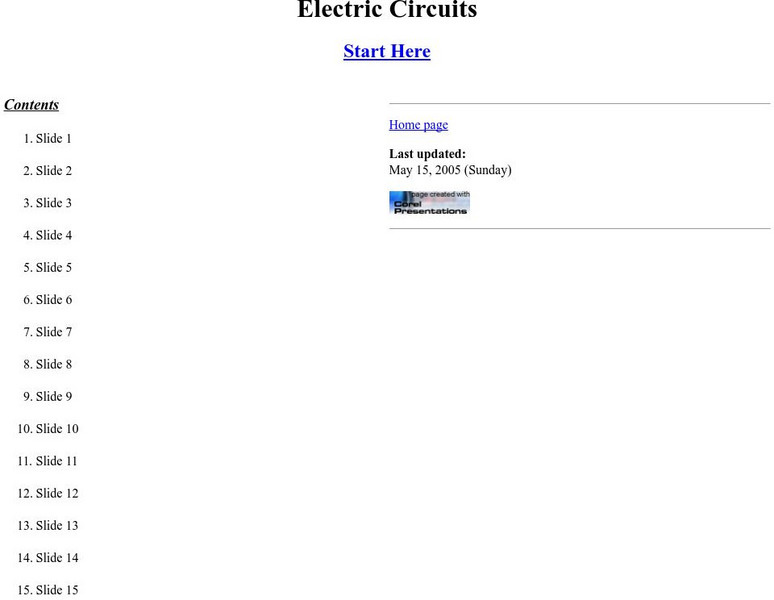Hi, what do you want to do?
Physics Classroom
The Physics Classroom: What Is an Electric Circuit?
In this tutorial the concept of electric potential difference is discussed. Electric potential is the amount of electric potential energy per unit of charge that would be possessed by a charged object if placed within an electric field...
Physics Classroom
The Physics Classroom: Common Misconceptions Regarding Electric Circuits
In this tutorial, preconceived ideas regarding the nature of charge flow and the role of a battery in a circuit are addressed. In many instances, these preconceived notions about charge flow and batteries are incorrect ideas and are...
Physics Classroom
The Physics Classroom: Journey of a Typical Electron
In the wires of electric circuits, an electron is the actual charge carrier. In this article, an electron's path through the external circuit is introduced.
Physics Classroom
The Physics Classroom: Current Electricity: Electrical Resistance: Ohm's Law
There are certain formulas in physics that are so powerful and so pervasive that they reach the state of popular knowledge. The predominant equation which pervades the study of electric circuits is often referred to as the Ohm's law...
CK-12 Foundation
Ck 12: Physical Science: Electric Circuits
[Free Registration/Login may be required to access all resource tools.] Explains what an electric circuit is, its different parts, and how to represent it using a circuit diagram.
CK-12 Foundation
Ck 12: Fourth Grade Science: Physical Science: Electric Circuits
[Free Registration/Login may be required to access all resource tools.] Describes the parts of an electric circuit and identifies electric safety features and how to use electricity safely.
CK-12 Foundation
Ck 12: Interactive Physics for High School
This digital textbook covers core physics concepts and includes interactive features, real world examples, videos, and study guides.
CK-12 Foundation
Ck 12: Fourth Grade Science
This customizable digital textbook covers topics related to fourth-grade science. It is Next Generation Science Standards (NGSS) aligned.
Cosmo Learning
Cosmo Learning: Physics Ii: Electricity and Magnetism
A collection of video lectures from a fundamentals of physics course taught at Massachusetts Institute of Technology. The course is the second in the sequence and focuses on electricity and magnetism The videos feature topics on...
Cosmo Learning
Cosmo Learning: Introduction to Microelectronics
A collection of video lectures from an introduction to microelectronics taught at the University of California, Berkeley. The course teaches digital integrated circuits by covering circuit analysis and microelectronic devices and...
PBS
Pbs Teachers: Pet Tech: Locating Land Mines
Research the location of land mines by animals and technological methods. Use a metallic probe to uncover the location of an electric-circuit target (representing a buried land mine) without setting off the "bomb".
Hunkins Experiments
Hunkin's Experiments: Electric Shocks!!
Hunkin's Experiments is a group of simple cartoon illustrations of scientific principles. Some would work well in the classroom, but others have little value beyond entertaining students. All of the projects are easy to do. These...
PBS
Pbs Teachers:electrical Messages
Explore circuits and the flow of electricity by creating a communication device with a cell battery and electrical buzzer.
Upper Canada District School Board
Tom Stretton's Chemistry Pages: Electric Circuits
Learn the voltage formula for determining a measure of current electricity in this illustrated presentation.
Science4Fun
Science4 Fun: Batteries
What are batteries? Explores the difference between batteries and cells, how batteries work, and the different types.
Science4Fun
Science4 Fun: Resistors, Capacitors, and Inductors
Electric circuits are used to provide a path to electric current. They commonly use three basic electrical components, which are resistors, capacitors, and insulators. They affect the electric current and changes the behavior of the...










